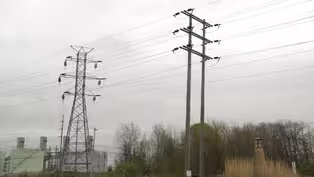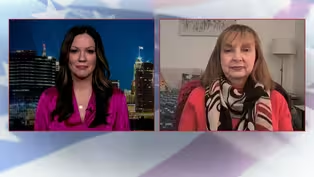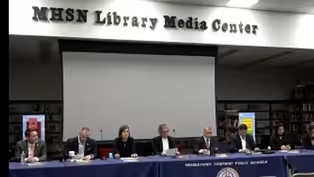NJ Spotlight News
Disparities exist in NJ children prosecuted as adults
Clip: 2/14/2025 | 4m 47sVideo has Closed Captions
Interview: Amanda Leavell, Human Rights Watch
A new report from Human Rights Watch found that Black youths in New Jersey were 19 times more likely to be prosecuted as adults than white youths, and Latino youths almost four times as often.
Problems playing video? | Closed Captioning Feedback
Problems playing video? | Closed Captioning Feedback
NJ Spotlight News is a local public television program presented by THIRTEEN PBS
NJ Spotlight News
Disparities exist in NJ children prosecuted as adults
Clip: 2/14/2025 | 4m 47sVideo has Closed Captions
A new report from Human Rights Watch found that Black youths in New Jersey were 19 times more likely to be prosecuted as adults than white youths, and Latino youths almost four times as often.
Problems playing video? | Closed Captioning Feedback
How to Watch NJ Spotlight News
NJ Spotlight News is available to stream on pbs.org and the free PBS App, available on iPhone, Apple TV, Android TV, Android smartphones, Amazon Fire TV, Amazon Fire Tablet, Roku, Samsung Smart TV, and Vizio.
Providing Support for PBS.org
Learn Moreabout PBS online sponsorshipA new report from Human Rights Watch is protesting the power prosecutors hold over whether a child accused of a serious crime gets tried in juvenile or adult court.
The decision is referred to as a waiver, and it can result in dramatically different sentences and treatment for the defendant.
According to the research, Black and Latino youth get disproportionately waived out of the juvenile justice system compared to white youth that determines how they're treated, where they're incarcerated, and the opportunities they'll have to get back on their feet after serving time, essentially their fate.
Amanda Leavell s the author of the report for Human Rights Watch, and is with me now to dig into the findings.
Amanda, good to talk to you.
Fascinating report.
Just how much of a role do prosecutors play in deciding whether a case gets waived?
And where do judges stand in this?
Yeah, that's a good question, Brianna.
Prosecutors play pretty much the sole role, I think, on in the law.
The judges are tasked with just assessing whether or not a prosecutor is their discretion.
Which is a very it's a very low bar.
Basically, the prosecutor just if they decide that they want to weigh the case, once they've gone through the process of, the, the defense can submit any sort of materials, but it pretty much is a unilateral decision made by the prosecutors.
So once the prosecutors say I want this case to be waived to adult court, there's little, it seems from your research, that's can be done to change that from the bench.
Exactly.
The only way that that can be changed is if the judge decides that the prosecutor has abused their discretion.
Got it.
Okay, so talk to me a little bit about the disparities that you found.
You looked specifically at the end of last year to compare, white youths with black and brown youths.
Yeah.
And it's hard because I think the data is very there's a lag in the data, but the justice required to to produce a report every two years, and even that report will be from about 3 to 4 years ago.
But based on data of the youth that are actually currently incarcerated in JJC, there were about, I'd say the average the population of black youth in in new Jersey is about 15%.
They account for a staggering, I think, 62% of those that are way to the adult system.
The JJC, of course, being the Juvenile Justice Commission, which pushed back on your findings and said, essentially, once you control for the severity of the offense, there's actually little evidence that these racial disparities exist for youth being tried in adult court.
I mean, what do you say to that?
Yeah, I guess it wouldn't necessarily be a pushback.
I think it's just looking at where the disparities are occurring so that they're saying that there isn't.
If you take into account first and second degree offenses, that there isn't a disparity in the waiver rate.
But really, that's already taking like the youth that are charged with first and second degree offenses where the disparities can happen much earlier on, and then they just kind of get compounded as you look at the pool of youth who are actually subject to those, to those waivers, if that makes sense.
No.
Yeah, I follow that.
So I mean, why does it matter?
Right.
If someone's case gets waived to an adult court, versus staying within the juvenile justice system?
Yeah, it's it's such a severe and consequential decision for a child.
It's basically.
But we'd liken it to throwing away the life of a child in the report because the consequences are lifelong.
Once a child is prosecuted as an adult, they are seen in all aspects as an adult, by, by the courts and by society.
And so I think when you think about having a felony record for the rest of your life or a choice that you made when you were 15 or 16 years old, that follows you and it affects your ability to have, employment opportunities in the future for housing for every aspect where you are going to be treated, and branded for life as a felon.
Is there anything that can rectify this, or gives maybe judges more discretion in whether or not a case is waived?
Yeah, it's definitely it's the law.
It's this is what's embedded in you all statute in new Jersey.
And, the report that, advocates for eliminating waiver altogether, but in the meantime is a step towards that could be moving the decision making power from prosecutors to judges by changing law.
Amanda Leavell is with Human Rights Watch and is the researcher and author of a new report called Kids You Throw Away.
Amanda, thanks so much.
You know.
Blame game as electric bills to jump this summer
Video has Closed Captions
Clip: 2/14/2025 | 4m 40s | After June 1, the average NJ resident will spend an additional $22-$28 per month (4m 40s)
Can NJ Transit count on federal funding?
Video has Closed Captions
Clip: 2/14/2025 | 5m 7s | NJ Transit is bracing for the worst, with no backup plan if the federal money gets frozen (5m 7s)
How much power do NJ's political machines have left?
Video has Closed Captions
Clip: 2/14/2025 | 5m 5s | The upcoming 2025 gubernatorial race may give the first real answers (5m 5s)
Middletown school board removes transgender student policy
Video has Closed Captions
Clip: 2/14/2025 | 1m 8s | Appellate court ruled school districts can rewrite their own policies (1m 8s)
Providing Support for PBS.org
Learn Moreabout PBS online sponsorship
- News and Public Affairs

Top journalists deliver compelling original analysis of the hour's headlines.

- News and Public Affairs

FRONTLINE is investigative journalism that questions, explains and changes our world.












Support for PBS provided by:
NJ Spotlight News is a local public television program presented by THIRTEEN PBS



